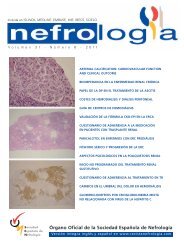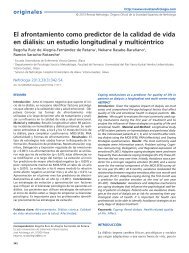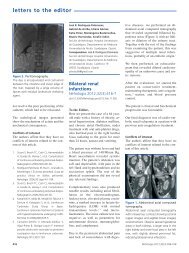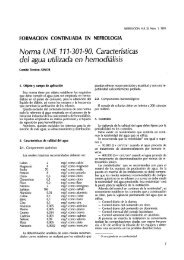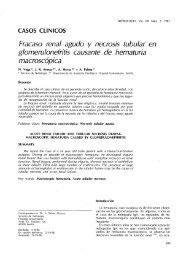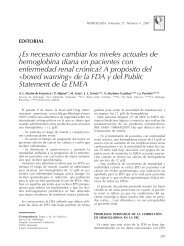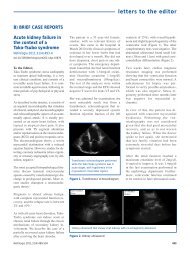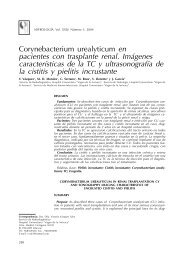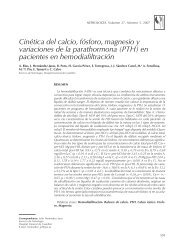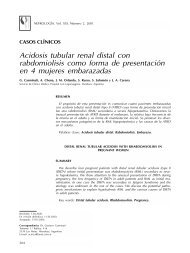PDF Número - NefrologÃa
PDF Número - NefrologÃa
PDF Número - NefrologÃa
You also want an ePaper? Increase the reach of your titles
YUMPU automatically turns print PDFs into web optimized ePapers that Google loves.
cartas al director<br />
studies up to 40% 5 of renal transplant<br />
recipients. Such adverse events can extend<br />
along the entire GI tract, and can<br />
vary in severity from those which are<br />
mild (nausea, discomfort, appetite loss)<br />
and do not require altering immunosuppressive<br />
regimen to those which are<br />
more severe or even life threatening<br />
(severe diarrhea, GI tract ulcerations,<br />
hemorrhage and perforations). 4,6<br />
The etiology of GI disorders following<br />
transplantation is not well understood.<br />
Because of enterocyte dependency for<br />
de novo purine synthesis MMF exposure<br />
could thus restrict the ability of intestinal<br />
epithelial cells to maintain normal<br />
barrier function, or decrease their<br />
capacity to recover from damage. 7<br />
Our patient has experienced a life<br />
threatening, severe lower GI bleeding<br />
which reoccurred within 2 days upon<br />
initial stabilization while on a stable<br />
immunosuppressive regimen. Upon<br />
dose reduction, the bleeding had<br />
stopped, indicating the possible adverse<br />
effect of MMF.<br />
A database from the United States<br />
Food and Drug Administration’s (US<br />
FDA) Adverse Event Reporting System<br />
(AERS), containing more than<br />
4,000,000 adverse events reported<br />
between 2004 and 2011, has a record<br />
of 9 cases of haematochezia (0.02%)<br />
associated with MMF treatment<br />
(www.drugcite.com; accessed Feb 1,<br />
2012).<br />
We have reported this case to the Croatian<br />
National Drug Agency and in feed-<br />
Figure 1.<br />
Nefrologia 2013;33(1):134-54<br />
back letter have been informed that it is<br />
a serious, unexpected adverse drug reaction,<br />
possibly associated with MMF<br />
treatment. A total of 16 cases have been<br />
reported to the WHO Adverse Drug Reaction<br />
Monitoring Center with two fatal<br />
outcomes (WHO, UMC VigiBase,<br />
29 th November 2011).<br />
Clinicians should be aware of possible,<br />
rare, but life threatening, lower GI<br />
bleeding associated with MMF treatment<br />
in renal transplant patients. Special<br />
caution should be given to patients<br />
with digestive system disease even if<br />
asymptomatic.<br />
Conflict of interest<br />
The authors declare that there is no conflict<br />
of interest associated with this<br />
manuscript.<br />
1. Behrend M. Adverse gastrointestinal<br />
effects of mycophenolate mofetil:<br />
aetiology, incidence and management.<br />
Drug Saf 2001;24:645-63.<br />
2. Zolezzi M. Mycophenolate Sodium<br />
versus Mycophenolate Mofetil: A Review<br />
of Their Comparative Features. Saudi J<br />
Kidney Dis Transpl 2005;16:140-45.<br />
3. Selbst MK, Ahrens WA, Robert ME,<br />
Friedman A, Proctor DD, Jain D.<br />
Spectrum of histologic changes in<br />
colonic biopsies in patients treated with<br />
mycophenolate mofetil. Mod Pathol<br />
2009;22:737-43.<br />
4. Ponticelli C, Passerini P. Gastrointestinal<br />
complications in renal transplant<br />
recipients. Transpl Int 2005;18:643-50.<br />
5. Placebo-controlled study of<br />
mycophenolate mofetil combined with<br />
cyclosporin and corticosteroids for<br />
prevention of acute rejection. European<br />
Mycophenolate Mofetil Cooperative<br />
Study Group. Lancet 1995;27:345:1321-<br />
5.<br />
6. Davies NM, Grinyó J, Heading R, Maes<br />
B, Meier-Kriesche HU, Oellerich M.<br />
Gastrointestinal side effects of<br />
mycophenolic acid in renal transplant<br />
patients: a reappraisal. Nephrol Dial<br />
Transplant 2007;22:2440-8.<br />
7. Arns W. Noninfectious gastrointestinal<br />
(GI) complications of mycophenolic acid<br />
therapy: a consequence of local GI<br />
toxicity? Transplant Proc 2007;39:88-93.<br />
Goran Hauser 1 , Ivan Bubic 2 , Vera Vlahovic-<br />
Palcevski 3 , Josip Spanjol 4 , Davor Stimac 1<br />
1<br />
Department of Gastroenterology. Clinical<br />
Hospital Centre. Rijeka (Croatia).<br />
2<br />
Nefrology Department. Clinical Hospital<br />
Centre. Rijeka (Croatia).<br />
3<br />
Department of Clinical Pharmacology.<br />
Clinical Hospital Centre. Rijeka (Croatia).<br />
4<br />
Department of Urology.<br />
Clinical Hospital Centre. Rijeka (Croatia).<br />
Correspondence: Goran Hauser<br />
Department of Gastroenterology, Clinical<br />
Hospital Centre. Kresimirova 42. 51000,<br />
Rijeka, Croatia.<br />
ghauser@medri.hr<br />
A long-term follow-up<br />
of an Imerslund-<br />
Grasbeck syndrome<br />
patient with<br />
proteinuria<br />
Nefrologia 2013;33(1):147-8<br />
doi:10.3265/Nefrologia.pre2012.Aug.11661<br />
Dear Editor,<br />
Imerslund-Grasbeck syndrome (IGS) is<br />
a rare autosomal recessive disorder<br />
characterized by megaloblastic anemia<br />
due to selective vitamin B 12<br />
malabsorption<br />
and asymptomatic proteinuria. 1<br />
IGS occurs in the first 1-2 years of the<br />
life and megalablostic anemia is responsive<br />
to parenteral vitamin B 12<br />
treatment.<br />
2 It is thought that proteinuria is<br />
benign in IGS; however, there is no sufficient<br />
number of follow-up series in<br />
IGS.<br />
Case report<br />
A 22-year-old woman had been referred<br />
to our pediatric outpatient clinic with<br />
the complaints of pale skin, loss of appetite,<br />
ataxia and diarrhea-constipation<br />
periods when she was 2-year-old. The<br />
clinical examination and laboratory<br />
studies revealed pallor of conjunctiva,<br />
megaloblastic anemia with vitamin B12<br />
deficiency (serum vitamin B 12<br />
level<br />



